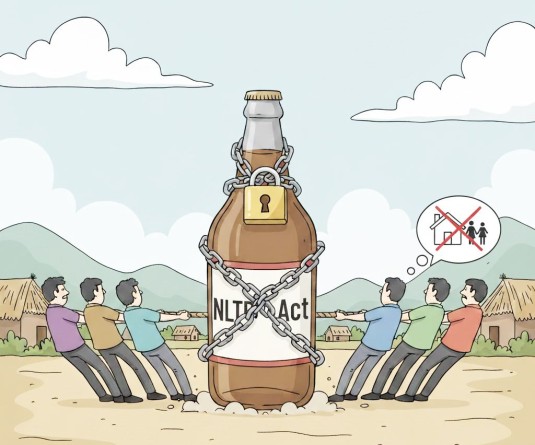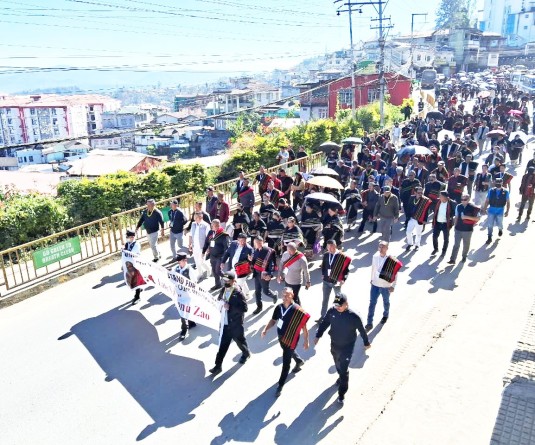
Seminar on ‘Child Labour, Human Trafficking and Christian Parenting’
Morung Express News
Kohima | September 16
A seminar on ‘Child Labour, Human Trafficking and Christian Parenting’ organised by the Konyak Nyupuh Sheko Khong (KNSK) Kohima Unit and Konyak Baptist Buminok Kohima (KBBK) Sheko Khong was held on September 16 at Red Cross Complex Kohima.
The resource persons for the workshop were Nino Iralu, Member Secretary, NSLSA, Limasenla Longkumer, Trainer and Legal Aid Counsel, NSLSA and A. Yanang Konyak, Chairman, NPSC.
Speaking on the topic of Child Labour, Human Trafficking and its legal implications, Iralu highlighted the rights of the child such as right to education, right to freedom of expression, thought and participation and right to recreation and cultural activities. On the Right to recreation and cultural activities, Iralu mentioned, “This right is often deprived to our children especially on the imparting of cultural knowledge and values. We have failed on our corresponding duty to teach our children.”
For Naga women who possess a lot of cultural knowledge and traditional skills, it is also a responsibility to impart the knowledge to the children. “Children have the right to inherit this cultural heritage,” asserted Iralu.
The knowledge and ability of each child should not be underestimated, viewed Iralu speaking in the context of a child’s right to freedom of thought and expression. Further Iralu also urged the parents to be equal partners in education their children instead of depending on schools and educational institutions.
“When we fail to understand our children, they feel neglected. Emotional constraint can often lead to social evils and depression,” stated Iralu highlighting many provisions of child protection and welfare schemes which falls under the Department of Labour, Social Welfare etc. “For this system to reach the children requires all of your participation and help,” noted Iralu.
Stressing on child labour in the context of Nagaland, Iralu clarified that child labour in Nagaland is different from the different forms of child labour in other states which needs to be clearly understood by the Naga public. In Nagaland, child labour comes in the form of ignorance especially supposedly charity work where children from lesser privileged areas are lured to the provision of education by working in other people’s homes. While the education of the child is provided, they are also made to overwork in the foster homes, viewed Iralu, where the basic right of a child of a carefree childhood is also denied.
Therefore, Nino Iralu also expressed the need for more NGOs to emerge to work towards the welfare of children and women. “Let us come out of our culture of silence and move towards a culture of zero tolerance,” remarked Iralu.
“Home is often considered the safest place for a child but inside the room we are not aware of what is happening,” stated Limasenla Longkumer while talking about the growing cyber related crimes in Nagaland. The number of internet users in Nagaland is much higher than any state in India, according to Longkumer which also points out the danger of increasing cyber crimes and cyber victims.
Viewing that constant updates on social media especially Facebook are signs of ignorance and not progress, Longkumer informed that such updates provides an easy route for offenders. “Cyber criminals are qualified programmers therefore precautionary measures have to be made while banking or shopping online,” warned Longkumer highlighting that one of the increasing cyber crimes is Phishing where fraud calls are made to extract money from gullible victims. Emphasis was also laid on Intellectual property rights, where Longkumer pointed out that Nagas have to make themselves aware of their intellectual property rights especially to protect its rich cultural heritage and traditions.
On Christian parenting, A. Yanang Konyak clarified that women are not helpers in the family but companions and partners and deserve equality in all aspects of life. Authoritarianism on the part of parents should be discouraged, according to Konyak who also stressed that a major responsibility of the parents is to accept and commit themselves to the responsibility of taking care of their children especially on their spiritual, physical and mental growth and needs.


.jpg)


.jpg)
